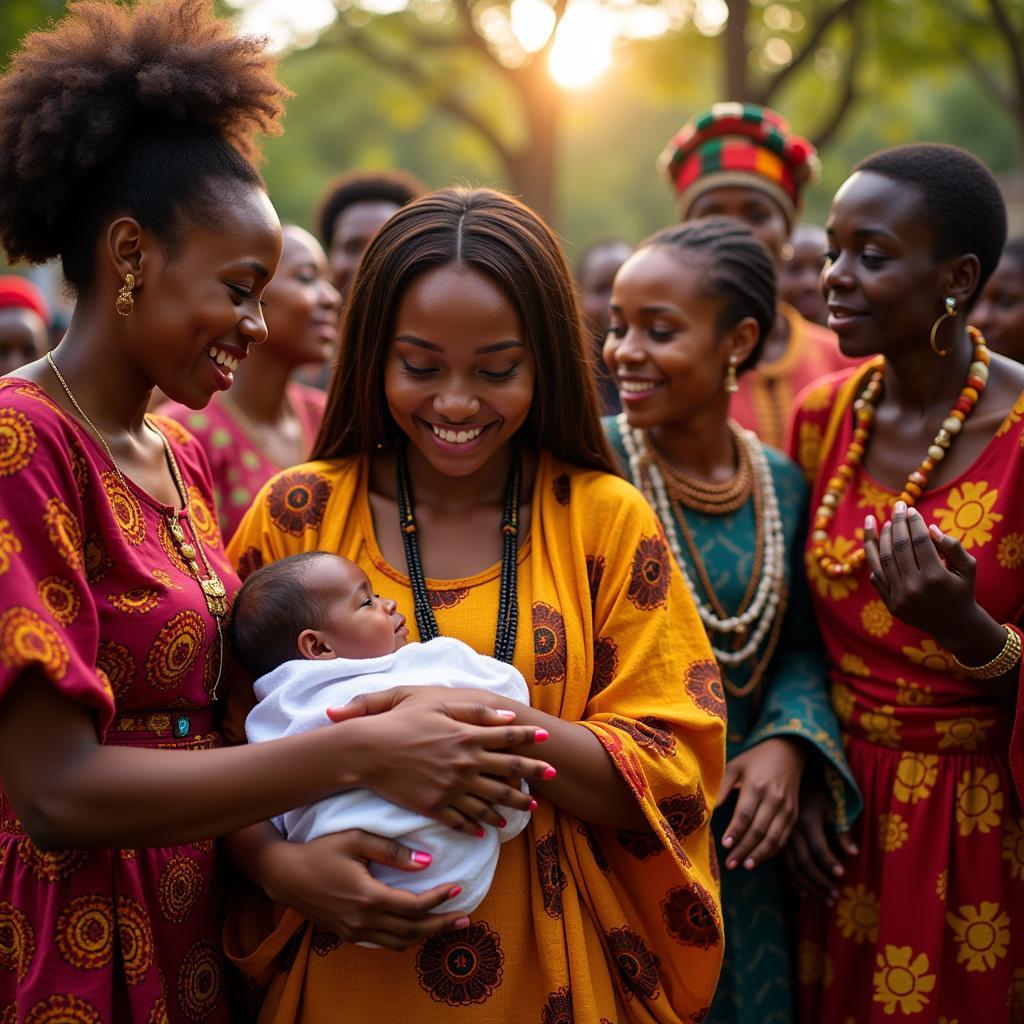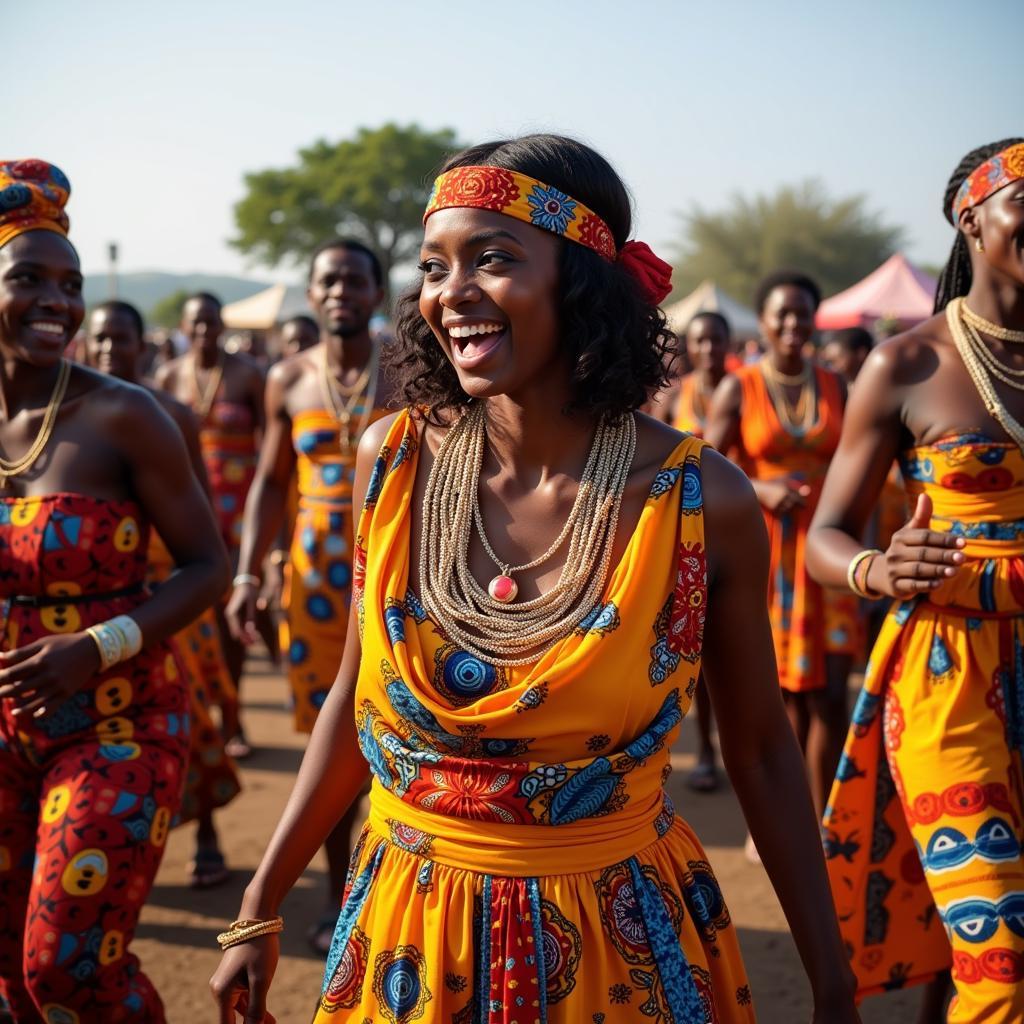African Culture Names: A Journey into Meaning and Heritage
African Culture Names are more than just identifiers; they are stories whispered through generations, reflections of rich history, and expressions of hopes and dreams. This exploration takes you on a journey into the captivating world of African naming traditions, uncovering their significance and beauty.
The Significance of Names in African Culture
In many African cultures, a name is a powerful symbol, intrinsically linked to a person’s identity and destiny. Names often reflect circumstances surrounding a child’s birth, ancestral connections, personal characteristics, or aspirations for the future. This deep-rooted meaning elevates names to cherished legacies passed down through families.
 African family celebrating the birth of a child
African family celebrating the birth of a child
For example, the Yoruba people of Nigeria have a rich tradition of “Oriki” names, poetic praise names that speak to a person’s lineage and destiny. These names are more than just labels; they are invocations of ancestral blessings and affirmations of potential.
Exploring Different Types of African Names
From the sands of the Sahara to the lush rainforests, the diversity of the African continent is reflected in its naming traditions. Here are some fascinating examples:
- Birth Order Names: In many cultures, birth order plays a significant role in naming. Firstborn children often receive names that signify their position as trailblazers, while names for subsequent children might reflect the growing family or specific events at the time of their birth. For a deeper dive into African names inspired by birth order, explore our collection of common African names.
- Circumstantial Names: These names often reflect the circumstances surrounding a child’s birth. For instance, a child born during a period of hardship might be given a name that signifies resilience and hope.
- Ancestral Names: Honoring ancestors is a cornerstone of many African cultures, and naming practices beautifully reflect this. Children are often given the names of grandparents, great-grandparents, or other revered figures, creating a tangible link to their lineage and heritage. Discover beautiful examples of African ancestral names in our article on African child names.
- Virtue Names: Many African cultures place a strong emphasis on virtues like kindness, bravery, and wisdom. Parents often choose names that reflect these values, hoping to instill them in their children. This tradition is particularly evident in the names given to African heroes throughout history.
The Influence of Language and Region
Africa is a continent of linguistic richness, boasting over 2,000 languages. This linguistic diversity is mirrored in the vast array of names found across the continent. While some names might be common across regions, others are specific to certain language groups or ethnicities.
For example, names like “Amina” and “Mohammed” are widely recognized due to the influence of Islam in North Africa. In contrast, names like “Thandiwe” (meaning “beloved”) and “Mandla” (meaning “strong”) are more common in Southern Africa, reflecting the linguistic heritage of Bantu languages.
Modern Trends and the Evolution of African Names
While traditional naming practices remain strong, modern influences are shaping the landscape of African culture names. Many parents are opting for unique and contemporary names that reflect their aspirations for their children in a globalized world.
Additionally, there’s a growing interest in reclaiming and celebrating indigenous names. This trend reflects a broader movement of cultural revival and a desire to connect with ancestral roots. To explore the beauty and meaning of traditional African names, browse through our collection of African baby names with meaning.
African Culture Names: A Tapestry of Identity
The study of African culture names offers a fascinating glimpse into the continent’s rich tapestry of cultures, languages, and traditions. From the profound meanings embedded in each name to the stories they tell, these names are a testament to the enduring legacy of African heritage.
As we’ve journeyed through this exploration of African naming traditions, we’ve uncovered the depth and beauty woven into each name. These names are more than just labels; they are threads connecting generations, celebrating individuality, and carrying forward the spirit of Africa’s diverse cultures.
 Celebration of African culture with music and dance
Celebration of African culture with music and dance
FAQ
1. Are African names only used in Africa?
No, African names have gained popularity globally, with many people outside of Africa appreciating their beauty and meaning.
2. Do all African cultures have the same naming traditions?
No, naming traditions vary significantly across different African cultures, reflecting the continent’s immense diversity.
3. Are African names difficult to pronounce?
While some African names might seem unfamiliar at first, with a little practice, their pronunciation becomes easier.
4. Can I give my child an African name if I am not African?
Choosing a name for your child is a personal decision. While it’s important to be respectful of cultural sensitivities, appreciating and celebrating diverse cultures through names is a beautiful thing.
5. Where can I learn more about specific African names and their meanings?
Our website offers a rich resource for exploring African cat names and numerous other categories of African names, providing insights into their meanings and origins.
Need More Information?
If you have any further questions about African culture or names, or if you’re looking for more specific information, please don’t hesitate to contact us.
Contact Us:
- Phone: +255768904061
- Email: kaka.mag@gmail.com
- Address: Mbarali DC Mawindi, Kangaga, Tanzania
Our dedicated team is available 24/7 to assist you with any inquiries you may have.



